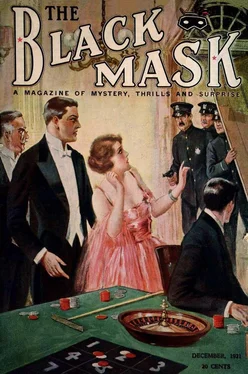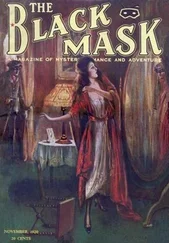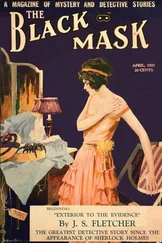Meredith Beyers - The Black Mask Magazine (Vol. 4, No. 3 — December 1921)
Здесь есть возможность читать онлайн «Meredith Beyers - The Black Mask Magazine (Vol. 4, No. 3 — December 1921)» весь текст электронной книги совершенно бесплатно (целиком полную версию без сокращений). В некоторых случаях можно слушать аудио, скачать через торрент в формате fb2 и присутствует краткое содержание. Город: New York, Год выпуска: 1921, Издательство: Pro-distributors Publishing Company, Жанр: Классический детектив, на английском языке. Описание произведения, (предисловие) а так же отзывы посетителей доступны на портале библиотеки ЛибКат.
- Название:The Black Mask Magazine (Vol. 4, No. 3 — December 1921)
- Автор:
- Издательство:Pro-distributors Publishing Company
- Жанр:
- Год:1921
- Город:New York
- ISBN:нет данных
- Рейтинг книги:3 / 5. Голосов: 1
-
Избранное:Добавить в избранное
- Отзывы:
-
Ваша оценка:
- 60
- 1
- 2
- 3
- 4
- 5
The Black Mask Magazine (Vol. 4, No. 3 — December 1921): краткое содержание, описание и аннотация
Предлагаем к чтению аннотацию, описание, краткое содержание или предисловие (зависит от того, что написал сам автор книги «The Black Mask Magazine (Vol. 4, No. 3 — December 1921)»). Если вы не нашли необходимую информацию о книге — напишите в комментариях, мы постараемся отыскать её.
The Black Mask Magazine (Vol. 4, No. 3 — December 1921) — читать онлайн бесплатно полную книгу (весь текст) целиком
Ниже представлен текст книги, разбитый по страницам. Система сохранения места последней прочитанной страницы, позволяет с удобством читать онлайн бесплатно книгу «The Black Mask Magazine (Vol. 4, No. 3 — December 1921)», без необходимости каждый раз заново искать на чём Вы остановились. Поставьте закладку, и сможете в любой момент перейти на страницу, на которой закончили чтение.
Интервал:
Закладка:
I’ll tell you about it.
Do you remember James J. Plainfield, the man who made twenty or thirty millions out of railway and steamship lines in the West and died a few years ago? You do, I guess; everybody does. I never met him myself, but at the time I am speaking of it was part of my day’s work to look up him and his past history pretty thoroughly.
Did you ever hear of a place he built out here on the West Coast to entertain a king? He called it the “Aerie” — eagle’s nest, you know. He was that kind of a fellow — big and rough and blustering but with a sort of poet’s imagination. It was that which had brought him up from a common sailor to what he was and which gave him the idea when his chance came to have a real king as a guest, to build this place up on the rocks to take him to and stand with him up there where he could take in the whole Pacific with one sweep of his hand and say, “Here, King, see this ocean? Well, I control that.”
He’s dead now, Plainfield is, but the king isn’t. I’ve got two letters at home from His Royal Highness — one asking for full details of what I found out about his friend’s house on the cliff and the other thanking me for my report. I don’t mind saying that in the second one he says that he feels sure that if I had been on the job he would have been perfectly safe.
Of course that is more of a compliment, like some kings like to make, than anything else, because this king never saw the “Aerie.” He got too busy with a war they were having over in Europe and had to cancel his acceptance of Jim Plainfield’s invitation. Jim Plainfield, himself, got pretty busy in that same war in the shipping end of it, and I guess he and all the rest of the world would have pretty nearly forgotten all about the “Aerie” if a newspaperman in Seattle hadn’t assembled a lot of facts and strung them together in a sensational story he called “The House of Fatal Mystery” which was copied all over the country.
That was the way I got in on it. The big chiefs in Washington read it and, as it was in our territory, we got orders to look into the matter, and it surely did seem serious and mysterious enough for somebody to look into.
It seems that in six months no less than four men, who were last seen in the neighborhood of the “Aerie,” had disappeared off the face of the earth. More than that, two women, who couldn’t tell what had happened to them or the missing men they had accompanied to the House on the Cliff, had been found exhausted and more than half crazy in the big woods that the place on three sides surround.
It was a House of Mystery all right, but as fine a structure as you ever saw. Plainfield had given orders that it was to be “fit for a king” — and it was in more ways than one.
It was a sort of glorified log-cabin, something like what I understand they call chalets or hunting lodges in Europe, but I don’t believe there is one in Europe like this House on the Cliff. Jim Plainfield, as I said, had been a common sailor, but he had a soul far above tar and ropes and canvas. He had roamed the far seas and seen a lot. He had studied a lot. And, when the riches came, he kept on traveling and seeing and reading. He loved the sea and his big yacht, the Fir, was a common sight on every ocean.
It was in this way he met the king. I never knew the exact details, but I believe he saved the king’s life or something like that during a yacht club regatta. At any rate, their friendship became common knowledge, and when the king planned a visit to America it was common gossip that he would be Plainfield’s guest when he reached the Coast.
Plainfield was always a very busy man and depended for details a great deal upon subordinates who had been with him for years, in most cases. So even in so important a matter as the building of this house for a king he only went as far as drawing the plans and giving directions for the furnishings. The actual superintendence of the thing, we learned, had been left to a man named Harry Stanwood, who had been steward of the big yacht, valet to Plainfield and generally his man of affairs in minor business and quite largely in social matters.
So, while the boss planned the house, it was really Stanwood who built it and had it all ready with every convenience to receive a king, and it was some job, too, out in that wilderness. Materials had to be hauled for miles and labor was very scarce. Stanwood, who was something of a mechanic, had to do a good deal of the work himself, but he had plenty of time, so it did not make a great deal of difference.
He was a most interesting sort of character. We found out all about him, because in our investigation we started out with Plainfield himself and gradually took in everybody who had had anything to do with the “Aerie.” Naturally Stanwood came second, because when the war came on and it was found that the king could not come and Plainfield became so busy with his shipping interests, he left Stanwood in charge of the house with permission to do as he pleased — practically gave it to him.
There used to be some gay old times out there, and Harry Stanwood became well known in all the Puget Sound country for his hospitality at the expense of his boss. It was war time and everybody was more or less on edge with war worry and speculation and German spy scares and one thing and another. It seemed to be a great relief to a lot of people to go out to the “Aerie” for a few days and sort of rest up.
Out there one could forget the war. Plainfield, himself, was above suspicion. Stanwood, the financially receptive host of the place, was past fifty years of age, apparently not desired for war duty and by his own statements of many years an Englishman — a statement borne out by his speech, manner and conversation.
Besides that, the State of Washington had voted “dry,” but the “Aerie” never seemed to have heard of the law going into effect. Stanwood ran no bar, but the cellar stock was checked against each paying guest and the cellar itself, in a sort of cave under the cliff, was one of the house’s principal points of interest. It was big enough to house a regiment — a natural formation in the rock upon which the house was built — and upon those notable occasions when Stanwood himself was host to his own particular cronies, he frequently ordered supper served underground where the wine and spirits were handy.
Not many people knew of the place. I have always doubted if Plainfield ever knew anything at all about what went on there, but among those who did know, the “Aerie” was a celebrated rendezvous. That was so until this newspaper article with its array of gruesome facts threw a damper of dark mystery about the whole region, cut off Stanwood’s source of revenue and probably hastened the death of Plainfield, which occurred within a few months and before the mystery surrounding his chalet had been solved.
II
We were really first drawn into the case in a sort of semi-official and confidential capacity. One of the men who had disappeared thereabout was a former assistant to a Cabinet officer who still had many friends in Washington. The circumstances were such that they did not want to call in the regular peace officers of the State of Washington. There was a matter of a little spree and a woman or two involved. We were called in as much to avoid publicity as anything else, but we got in good and deep — we and our old friend, the sea, after we had watched in vain for it to give up a body.
I won’t mention this man’s name. We succeeded in keeping the facts quiet and avoiding scandal even after we found his body. It’s the way we have in the service. But you must have read in the newspapers about the others. We found them and we also checked up on the two women found half crazy in the woods. I don’t wonder that they were.
Читать дальшеИнтервал:
Закладка:
Похожие книги на «The Black Mask Magazine (Vol. 4, No. 3 — December 1921)»
Представляем Вашему вниманию похожие книги на «The Black Mask Magazine (Vol. 4, No. 3 — December 1921)» списком для выбора. Мы отобрали схожую по названию и смыслу литературу в надежде предоставить читателям больше вариантов отыскать новые, интересные, ещё непрочитанные произведения.
Обсуждение, отзывы о книге «The Black Mask Magazine (Vol. 4, No. 3 — December 1921)» и просто собственные мнения читателей. Оставьте ваши комментарии, напишите, что Вы думаете о произведении, его смысле или главных героях. Укажите что конкретно понравилось, а что нет, и почему Вы так считаете.












